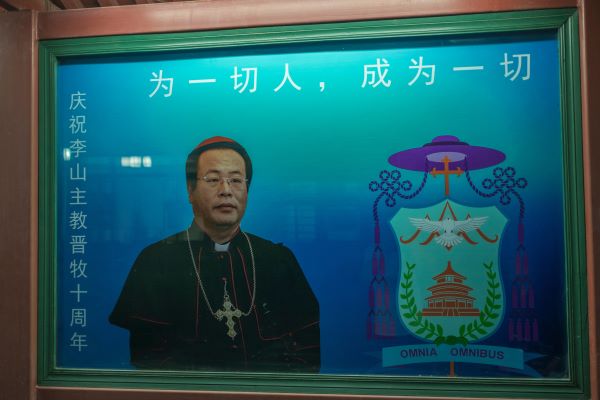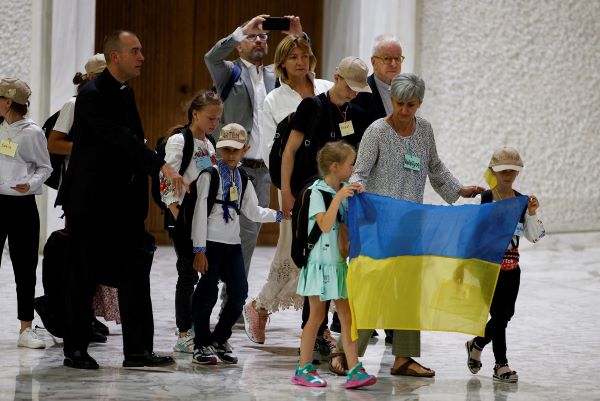Pope Francis condemned “madness on both sides” of the conflict in Ukraine, as he prayed for peace for “the beloved Ukrainian people who have been suffering the horrors of war for six months now”.
Speaking at his general audience on 24 August, Francis recalled the plight of prisoners of war and of children caught in the violence.
“I think of the children, so many dead, and so many refugees, many of whom are here,” he said, referring to several in the audience in the Paul VI Hall. “So many wounded. So many Ukrainian and Russian children have become orphans. Orphanhood has no nationality. Both Russians and Ukrainians have lost a father and a mother.”
Ukraine celebrates its independence day on 24 August, the date of its declaration of independence from the Soviet Union in 1991. This year, the date also marks six months since the Russian invasion on 24 February. It is the country’s main national holiday, but public celebrations were limited – instead of parades, a display of destroyed Russian tanks lined the main street of Kyiv.
In an interview with Radio Maria, Major Archbishop Sviatoslav Shevchuk, the head of the Ukrainian Greek Catholic Church, advised citizens to be “vigilant” and “law-abiding” in their celebrations, but warned against despair and said that “hopelessness for God’s mercy is one of the sins against the Holy Spirit”.
“We need to experience this particular day deeply prayerfully,” he said. “For Christians, prayer is a great power. We may not see all the spiritual dimensions as we see all the dimensions when a Russian rocket falls, but I think the mystical power of Christian prayer that breaks through the heavens is much stronger and greater.”
The Ecumenical Patriarch of Constantinople, Bartholomew I, sent a message to his “beloved spiritual children” in Ukraine, emphasising their historical connexion to his patriarchate and describing their situation in the words of the Book of Job: “when you waited for light, darkness came, days of affliction to meet you”.
“It is our conviction that no Church or Christian can justify any form of aggression by using religious language,” he said, referring to the Moscow patriarchate's support for the invasion in the cause of reuniting “the people baptised in the Dnieper”.
Western leaders used the occasion to affirm their support for Ukraine, with President Joe Biden pledging a further $3 billion (£2.5 billion) of US support while the UK’s outgoing prime minister, Boris Johnson, made a surprise visit to Kyiv. President Zelenskyy reiterated his commitment to recapture all Ukrainian territory “without concession or compromise”.
The Pope’s address emphasised his commitment to peace and his willingness to mediate between the combatants. He further lamented the innocent casualties of the war: “I think of that poor girl blown up by a bomb under her car seat in Moscow. The innocent pay for war, the innocent! Let us think about this reality and say to each other: war is madness.”
The Vatican later confirmed that he was referring to the death of Darya Dugina on 20 August, in a suspected car bomb attack. The 29-year-old was a political commentator and daughter of the influential Russian nationalist Alexander Dugin – an ally of President Putin and a vocal supporter of the invasion of Ukraine. Analysts suggested that he was the probable target of any attack.
Francis also prayed for the end of “forgotten” wars in Syria, Yemen, Myanmar and elsewhere. He recalled his consecration of Russia and Ukraine to the Immaculate Heart of Mary in March, and asked Our Lady to bring peace.
“We need peace,” he said.



 Loading ...
Loading ...